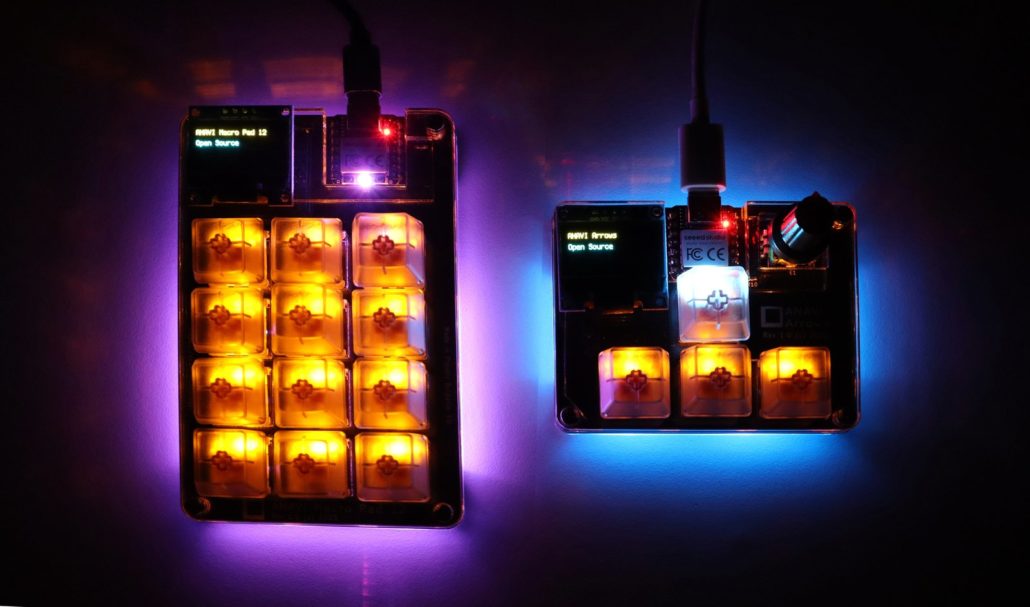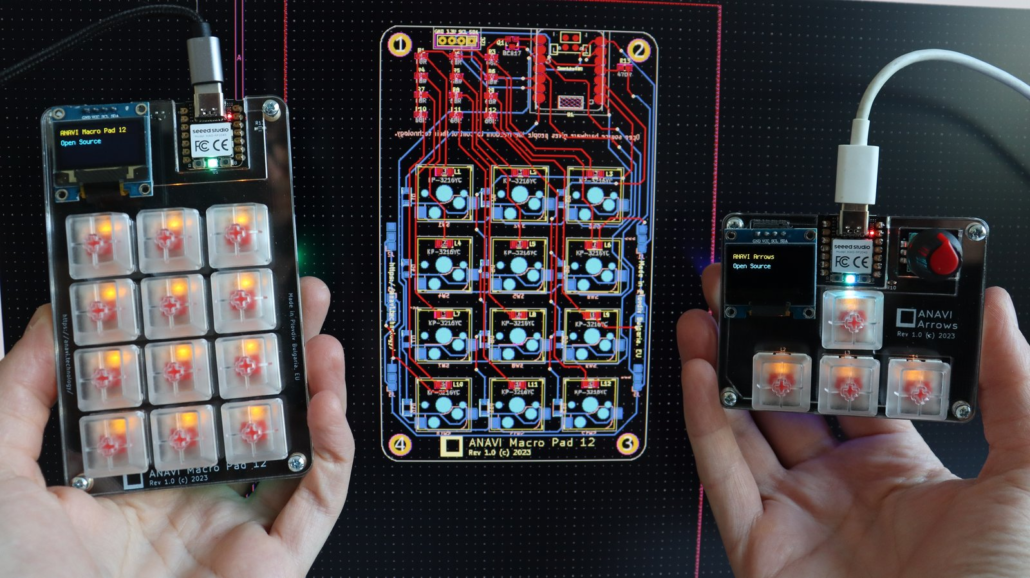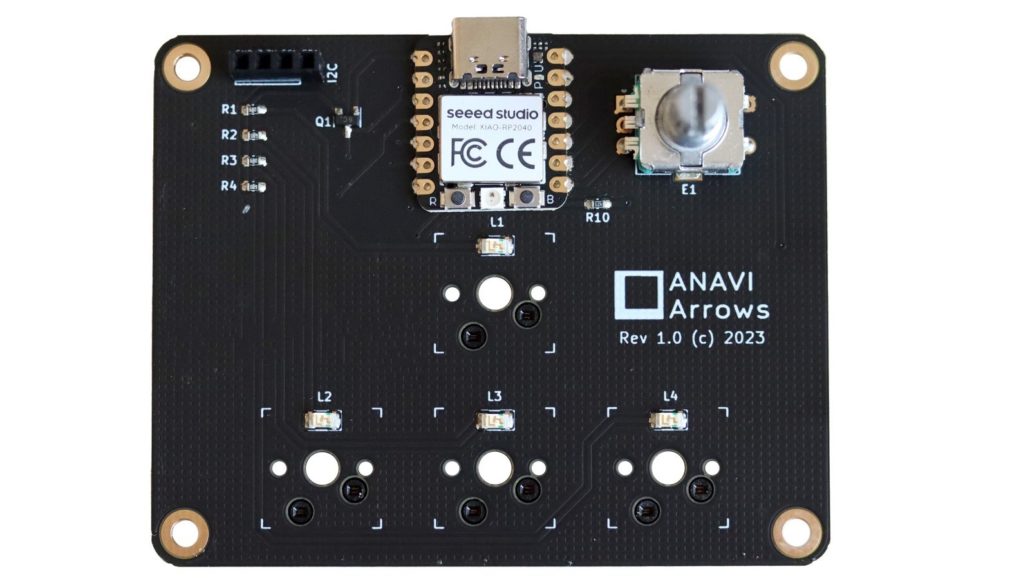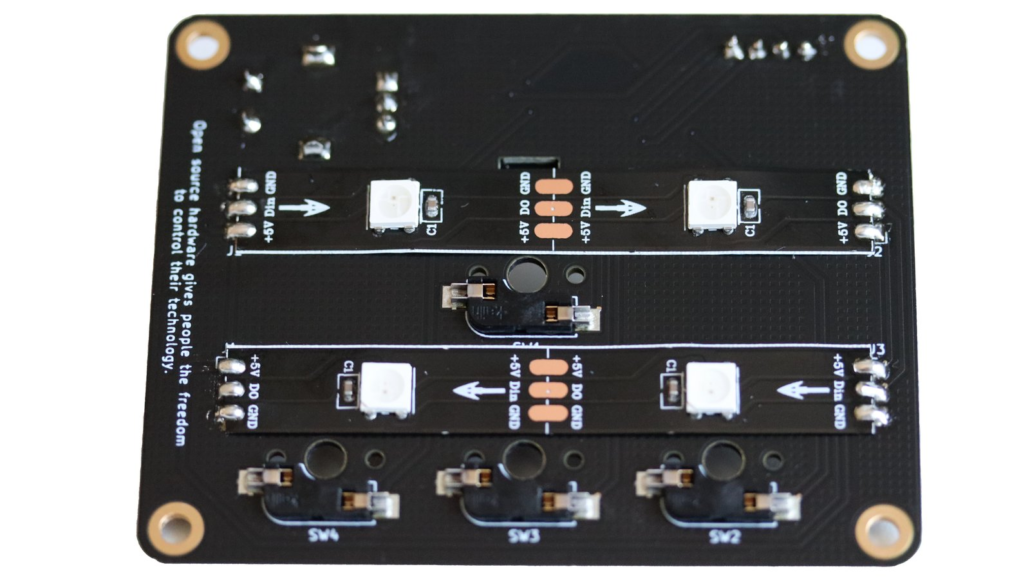ANAVI Launches CircuitPython-Programmable Macro Pad 12 & Arrows Mechanical Keyboards Powered by Seeed XIAO RP2040 & Seeed Fusion (Crowdfunding)
ANAVI Technology has launched two more open-source hardware mechanical keyboards based on the Raspberry Pi RP2040 microcontroller, equipped with an OLED display, and programmable with CircuitPython: the ANAVI Macro Pad 12 with 12 keys and the ANAVI Arrows with four keys and a rotary encoder.
The new mechanical keyboards follow ANAVI Macro Pad 10 & Knobs input devices equipped with the same Seeed Studio XIAO RP2040 MCU module running the KMK firmware written with CircuitPython, but with different form factors and features.

ANAVI Macro Pad 12 Specifications:
- MCU module – Seeed Studio XIAO RP2040 with Raspberry Pi RP2040 dual-core Cortex-M0+ microcontroller @ up to 133 Mhz with 264KB SRAM, 2MB SPI flash, USB Type-C port
- Keys – 12x Gateron red, linear, non-clicky mechanical switches and transparent keycaps with yellow LED backlighting
- Display – OLED display connected to I2C slot (can be replaced with another I2C module)
- Host interface – USB Type-C port from the XIAO RP2040 module
- Misc – RGB LED for each key on top, 6x WS2812B addressable LEDs for bottom-lighting
- Dimensions – 116.7 x 73.0 mm
ANAVI Arrows Specifications:
- MCU module – Seeed Studio XIAO RP2040 with Raspberry Pi RP2040 dual-core Cortex-M0+ microcontroller @ up to 133 Mhz with 264KB SRAM, 2MB SPI flash, USB Type-C port
- Keys – 4x Gateron red, linear, non-clicky mechanical switches and transparent keycaps with yellow LED backlighting
- Input – 1x rotary encoder with clickable switch
- Display – OLED display connected to I2C slot (can be replaced with another I2C module)
- Host interface – USB Type-C port from the XIAO RP2040 module
- Misc – RGB LED for each key on top, 4x WS2812B addressable LEDs for bottom-lighting
- Dimensions – 80.0 x 63.2 mm

You’ll find the CircuitPython source code for both mechanical keyboards on Github, and the ANAVI RP2040 mechanical keyboards can also be found in the official KMK repository. The firmware relies on the standard USB HID class, and the keyboards work in Windows, macOS, and Linux. Both keyboards are open-source hardware designs, and Leon ANAVI also released the KiCAD hardware design files for both the 12-keyboard and the Arrows board.
ANAVI Technology now has a range of seven mechanical keyboards based on the Raspberry Pi RP2040 or Microchip ATmega32U4/ATTiny85 microcontroller, so a table has been provided comparing the different features of each model so that you can select the one that better meets your needs.

As usual, the new ANAVI mechanical keyboards have been launched on Crowd Supply. The ANAVI Macro Pad 12 kit requires a $57 pledge, while the smaller ANAVI Arrows goes for $42. Shipping is free to the US but adds $12 to the rest of the world. Deliveries are scheduled to start by mid-October 2023.
Seeed Studio Fusion Custom PCB Assembly Agile Manufacturing and Hardware Customization from 0.1 to ∞
To ensure consistently high quality, the printed circuit boards (PCBs) of ANAVI Macro Pad 12 and ANAVI Arrows have a black solder mask and a gold surface finish. All kits are using the same key components: Seeed Studio XIAO RP2040, hot-swap sockets, Gateron red switches, translucent keycaps, and mini OLED display. The castellated holes on XIAO RP2040 allow easier assembly with surface-mount technology (SMT). All keyboards will be carefully flashed and tested with the open source KMK firmware.


Get unrivaled speed and efficiency when you innovate with vast resources in Shenzhen China. Learn more at Seeed Fusion. Send us your project plan today for a quotation.

- From prototype to mass production, accelerate your product’s time-to-market with Seeed Fusion
- Original Design Manufacturing (ODM) and Customization Solutions